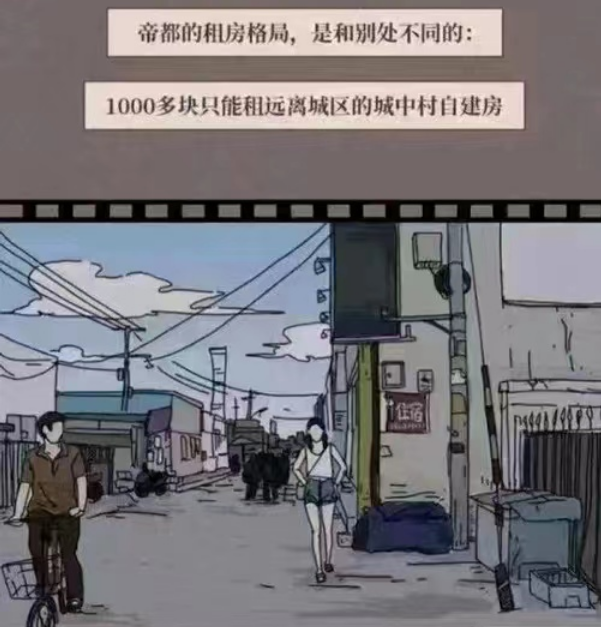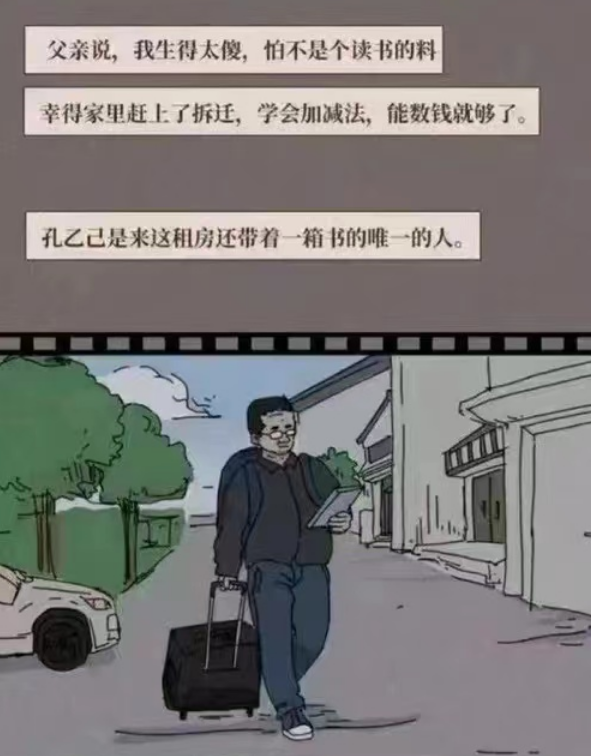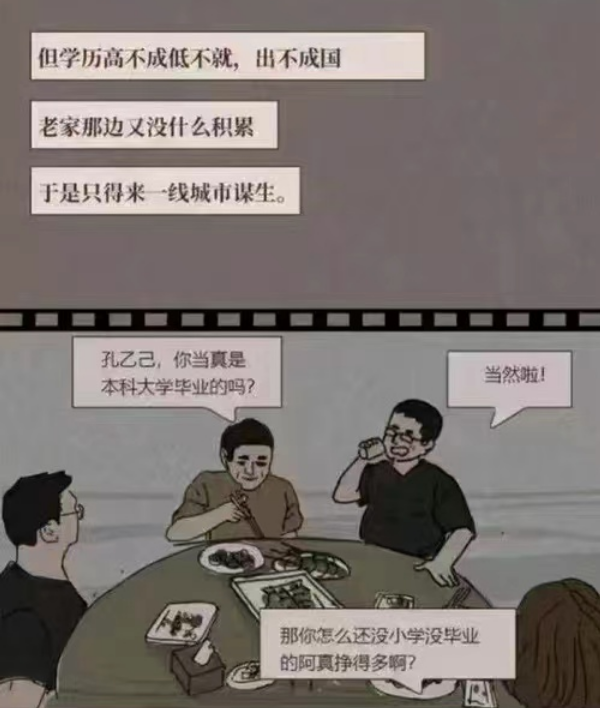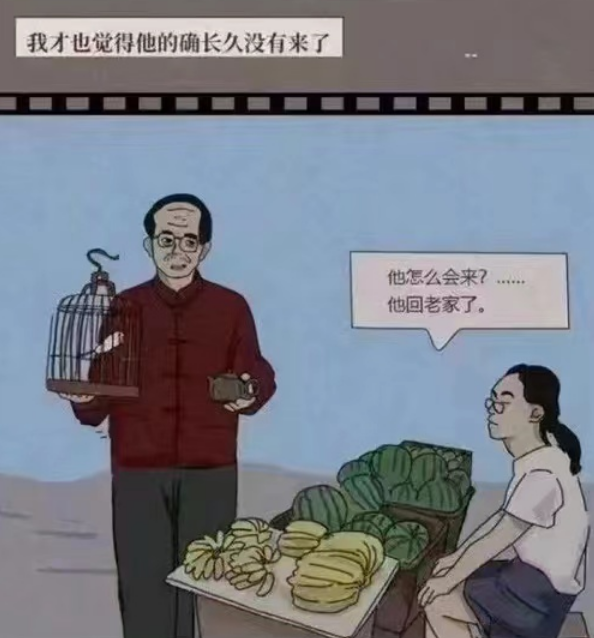“Kong Yiji literature” emerged as a self-deprecating meme among young Chinese netizens who joke that their academic credentials have made them “unemployable,” too overeducated or overqualified for the jobs currently available. They liken themselves to the titular protagonist of Lu Xun’s 1918 short story “Kong Yiji,” an impoverished scholar whose pedantic airs are mocked by the denizens of the tavern he frequents. After Kong Yiji’s legs are broken as punishment for stealing books, he drags himself into the tavern for one last drink, disappears, and is presumed dead—not that anyone around him seems to care. Lu Xun’s short story was a blistering critique of what he saw as the ills afflicting early twentieth-century Chinese society: the rigid and outdated imperial examination system, the destruction of the intellectual class, and an apathetic citizenry indifferent to the suffering of others.
While the recent iteration of “Kong Yiji literature” is more light-hearted than its namesake, it does speak to some of the problems of today: youth unemployment, urban poverty, limited socioeconomic mobility, and a hyper-competitive educational system that may not prepare students for a career after graduation. “When I first read the story,” explained one young netizen, “I didn’t really understand it. But now I’ve turned into the protagonist!” Another commented: “Everyone says a degree is a stepping stone, but I’m slowly coming to realize it’s more like a pedestal I can’t get down from, much like Kong Yiji couldn’t get out of his ‘scholar’s robes.’” “If I weren’t so educated, I could find some other kind of work to do,” lamented another, “but no, I just had to go and get an education!”
In mid-March, the “Kong Yiji literature” meme saw a resurgence after a joint social media post from the Communist Party Youth League and state broadcaster CCTV prompted a backlash for accusing unemployed or underemployed university graduates of being overly picky and having an aversion to hard work. Furious netizens hit back, accusing the author of the post “Facing Up to the Anxiety Behind ‘Kong Yiji Literature’” of misconstruing both the meme and Lu Xun’s original short story, and of gaslighting young people struggling in a genuinely tough job market. As RFA reported, many readers took issue with the smug, preachy tone of the post:
The Youth League and CCTV post […declared] that “the value of academic qualifications can only be realized when one’s potential is fully explored in creative, practical activities.”
“The reason why Kong Yiji fell into his predicament wasn’t because of his learning, but because he couldn’t let go of the airs of a scholar and was unwilling to change his situation through labor,” the CCTV and Youth League post said.
“The scholar’s long gown can shackle the mind, and temporary difficulties do not equal a lifetime of failure,” it said.
It was picked up in copycat editorials and short videos following the same line, including one short video on Bilibili in which a young woman is shown making deliveries to a home and removing packaging, while musing that having a degree shouldn’t “shackle” the mind. [Source]
The Weibo post was inundated with critical comments, but these were soon censored, leaving only the favorable comments visible. Some Weibo users got around this by forwarding versions of the post so that readers could leave comments. CDT Chinese editors have archived some of the comments left on Weibo and Zhihu, a selection of which are translated below:
Selected Weibo comments:
仙女甜了酱:The author praises higher education, while criticizing students for not abandoning their aspirations. He raises the bar for “lying flat” [slacking off], while also mocking “small town test-takers” [ambitious students from humble backgrounds]. Since when did the news media become so arrogant?
死不油腻:What I really want to know is this: if Mr. Lu Xun could hear about this post from his grave, what would he have to say about CCTV?
勵志天下9_601:Chalking up Kong Yiji’s tragic fate to his personal failings without even considering social factors, and using this to lob implicit criticism at today’s educated youth is not just ignorant and superficial, but malevolent.
Selected Zhihu comments:
我到不了:So Lu Xun wrote “Kong Yiji” as a critique of Kong Yiji? And here I thought it was a critique of the decadent old society! […] In Lu Xun’s works, the common people are apathetic, but Lu Xun never blamed that apathy on the common people themselves.
我在中间应当休息:Not this again! The wise old author of this post is truly a master of feigned ignorance. Do you suppose that when Lu Xun wrote “Kong Yiji,” he meant it as a satire of Kong Yiji himself, or was it a satire of society at that time? […] You state media types spend your days handling the rich and powerful with kid gloves, but you have the nerve to sneer at young people for not working hard enough?
无产者:Let me translate this post into the language of [Lu Xun’s] short story: the rare few who can afford to wine and dine in the tavern’s exclusive private room are superior to the masses. Yet those who stint at nothing to gain an education and the right to wear a “scholar’s gown” should be criticized. And then, shamelessly, you ask them: “Hey, how come you aren’t willing to exchange that scholar’s gown for a short tunic, and go join the manual laborers?” [Chinese]
Despite heavy comment censorship, the CCTV post continued to generate controversy, with many online commentators and essayists weighing in. An essay published on the WeChat account 非虚构故事 (Feixugou Gushi, “Non-fiction Stories”) criticized the CCTV post for its condescending tone and failure to recognize economic realities. The author noted that in 2023, China will add nearly 11.6 million new university graduates to the job market, an increase of 820,000 from 2022. And in Beijing, the number of graduate students (in both master’s and doctoral programs) surpassed the number of undergraduates for the very first time. A short excerpt from the essay:
Young people aren’t stupid, and everyone is well aware that state media has its own agenda. In the current economic downturn, many enterprises—particularly private companies—are struggling. The job market has shrunk significantly, and it cannot absorb all of the recent college graduates.
This is a structural social problem. But state media, ignoring the elephant in the room, paints it instead as a personal problem: if you can’t find enough jobs, it must be your own fault, and don’t blame society.
[…] As one netizen commented: “Education has made me dissatisfied with the status quo, but has left me powerless to change it.” [Chinese]
A WeChat essay by 龅牙赵 (Baoya Zhao, “Bucktoothed Zhao”) also pointed out the structural nature of youth unemployment. If university graduates were to lower their standards and begin taking manual labor jobs, as suggested by the controversial CCTV post, they would crowd out those currently working in manual labor. The author uses two fictional characters—Lu Xun’s Kong Yiji, and Camel Xiangzi, the protagonist of Lao She’s novel “Rickshaw Boy”—as stand-ins for white-collar and blue-collar workers, respectively:
We all understand the reason behind asking Kong Yiji to doff his scholar’s gown and go pull a rickshaw. It is a way to solve the problem of a large number of unemployed Kong Yijis by “guiding” them to engage in jobs that have nothing to do with their majors or academic credentials.
But you can’t just water down Camel Xiangzi’s already-thin gruel in order to solve Kong Yiji’s unemployment problem.
Kong Yiji can decide to take off his scholar’s gown and pull a rickshaw, but where does that leave Camel Xiangzi? [Chinese]
The rich variety of “Kong Yiji literature” memes include a musical version and a manga version that envisions Kong Yiji as an engineering college graduate barely eking out a living in a modern “urban village.” Whereas the narrator of Lu Xun’s short story was a boy who worked in the local tavern, the narrator in the manga is the son of a landlord who rents a room to Kong Yiji. And while Kong Yiji was brutally beaten and likely died in Lu Xun’s tragic tale, in the modern-day manga version, Kong Yiji simply slinks back to his hometown, behind in his rent and unable to make a go of life in the big city. Several panels of the manga are translated below:

Here in the imperial capital, the rental situation is different from other places: all you can get for 1,000 yuan a month is a room in an illegally-constructed building in an “urban village,” far outside the city proper.

My father said I was born stupid, and didn’t have the makings of a scholar.
Luckily, our family managed to cash in during the capital’s “demolition and construction” phase, so it was enough that I could add and subtract and count money.
Kong Yiji was the only one of our renters ever to arrive with a suitcase of books.

Kong Yiji was unwilling to take a job beneath his station, he couldn’t afford to go abroad, and his family didn’t have much in the way of savings, so his only option was to try his luck in this unfamiliar first-tier city.
Male diner: Kong Yiji, did you really graduate from a four-year university?
Kong Yiji: Of course!
Female diner: Then why do you earn less than Ah Zhen, who didn’t even graduate from primary school?

It was only then I realized that Kong Yiji hadn’t shown his face around here in a very long time.
Fruit-seller: He’s long gone. He went back to his hometown.
[Chinese]







